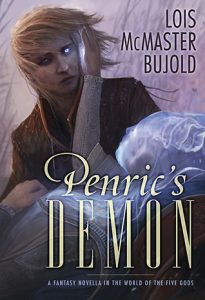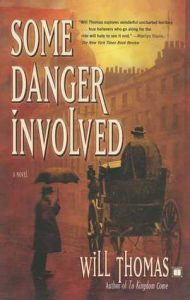 Penric and the Bandit (Penric and Desdemona #13) by Lois McMaster Bujold
Penric and the Bandit (Penric and Desdemona #13) by Lois McMaster Bujold Format: ebook
Source: purchased from Amazon
Formats available: ebook, audiobook
Series: Penric and Desdemona #13
Pages: 123
Published by Spectrum Literary Agency on July 1, 2024
Purchasing Info: Author's Website, Publisher's Website, Amazon, Barnes & Noble, Kobo
Goodreads
When Rozakajin, road-weary bandit and army deserter, spots a hapless blond young man in a country inn with an intriguing treasure map, he thinks he’s scouted an easy and lucrative victim. Attaching himself to odd traveler Penric seems simple enough, but when Roz’s old enemies catch up from behind, his plans take a turn for the much worse. When Pen’s claim that I never travel alone proves true in ways Roz never imagined, his world becomes more frightening still—but also much wider than he’d ever dared to dream.
My Review:
 Learned Divine Penric kin Jurald of Vilnoc is ALWAYS the single most dangerous person in the room in any situation because of his magic, his demon Desdemona, and the favor of his god, the Lord Bastard – and has been since the very first novella in this series, Penric’s Demon. He’s certainly more than a match for the lone bandit that has attached himself to Penric – if he needs to be.
Learned Divine Penric kin Jurald of Vilnoc is ALWAYS the single most dangerous person in the room in any situation because of his magic, his demon Desdemona, and the favor of his god, the Lord Bastard – and has been since the very first novella in this series, Penric’s Demon. He’s certainly more than a match for the lone bandit that has attached himself to Penric – if he needs to be.
Pen hasn’t decided whether or not he needs to be, so he’s dragging Roz along on his personal project to find a forgotten saint’s even more forgotten sanctuary in hopes of finding some precious treasure. To Pen, a scholar and translator among his many other avocations, long-lost documents IS a precious treasure.
Roz is hoping for something a bit more tangible and he’s willing to go along with the man he thinks is a gullible fool in order to get it.
But it’s all a bit of a test – not that there isn’t the possibility of some real treasure of both kinds.
Roz is on the run from the gang he’s been on the with since they all escaped from one kind of slavery after another. Pen thinks Roz might be on the pilgrimage road – even if Roz himself isn’t aware of that yet – and might be willing to take that road all the way from service through supplication, gratitude, divination and atonement, all the way to redemption – and a fresh start in his previously VERY hard-knock life.
At least Pen can hope. And minister – in his own way – to the wavering bandit. After all, bandits are one of the many ‘professions’ that are served by the Lord Bastard, avatar of chaos and the master of all disasters out of season – including thievery.
So Pen is on this little vacation – at least it was supposed to be a vacation – in search of lost documents. In Roz, he’s found a soul that might be willing to saved – at least from itself and its own bad decision.
However, back to the opening that Pen is always the single most dangerous person in the room. Roz is being chased by his six former ‘colleagues’, who have not given up banditry in the slightest and want revenge on Roz for stealing all their mules.
For Penric and Desdemona, six to two odds aren’t bad at all. They’re not even bad if Roz goes back to his former gang and the odds are seven to two. But six to three is even better. At least until the odds swell to include the gang that Roz’ former gang attached themselves to.
Thirty to three is a bit much even for Penric. Unless, of course, the favor of the Lord Bastard ensures that the odds – no matter what they are – turn in Penric’s favor.
 Escape Rating A: After the previous entry in this series, the rather cozy and close to home Demon Daughter, the adventure of Penric and the Bandit is very much just that – an adventure story.
Escape Rating A: After the previous entry in this series, the rather cozy and close to home Demon Daughter, the adventure of Penric and the Bandit is very much just that – an adventure story.
It’s a fun adventure because of the way that the bandit Roz thinks he’s taking advantage of the young and foolish seeming Penric, while Penric is really taking Roz’ measure in more ways than just the obvious.
Each of them believes they are ‘gulling’ the other – and only one of them is right. Or two, if you count Penric’s resident demon Desdemona.
But underneath the wild goose chase that bears all the fruit Penric could have desired, there’s also a story about redemption, about making another choice and stepping on a different path. The fascinating thing about Roz’ hesitant steps towards a different future is that the story never blames or moralizes about the choices he made in the past. Not that he didn’t commit crimes, but that he did the best he could with the lack of options he started with.
This is the story of a man who has never had any choices does when he finally has the chance to make a choice – and where that leads him. Penric has the patience to wait out that decision-making process – whether or not he is certain that his god is likely to force the circumstances a bit – as he often does – or not.
So this is an adventure. And it’s a story that takes one character – not through the famous stages of grief – but rather through the lesser known stages of a somewhat different sort of redemption that leads, not necessarily to any particular belief – but to a better life.
Along with a mad dash to take down a whole horde of bandits who really, really deserve it.
This novella series is always a lot of fun – with a fascinating lesson hidden inside each story. Like that proverbial box of chocolates. I’ve read them all, loved (and reviewed!) every single one, and always leave each story eager for the next – whenever it may appear.

 Guard the East Flank: a military romantic suspense (Night Stalkers Reload Book 1) by
Guard the East Flank: a military romantic suspense (Night Stalkers Reload Book 1) by  Lieutenant Colonel Emily Beale was a legend among the Night Stalkers. And so she should be, considering her many, many firsts and achievements and successful missions. (If you want details – and you should if you love military romance! – check out the original
Lieutenant Colonel Emily Beale was a legend among the Night Stalkers. And so she should be, considering her many, many firsts and achievements and successful missions. (If you want details – and you should if you love military romance! – check out the original  I’ve been a fan of this author since I read the very first
I’ve been a fan of this author since I read the very first  “Better Living Through Algorithms” by Naomi Kritzer in Clarkesworld Magazine Issue 200, May 2023) by
“Better Living Through Algorithms” by Naomi Kritzer in Clarkesworld Magazine Issue 200, May 2023) by  Ivy, Angelica, Bay by
Ivy, Angelica, Bay by 
 The Most Human: Reconciling with My Father, Leonard Nimoy by
The Most Human: Reconciling with My Father, Leonard Nimoy by  “The Year Without Sunshine” by Naomi Kritzer in Uncanny Magazine Issue 55, November-December 2023 by
“The Year Without Sunshine” by Naomi Kritzer in Uncanny Magazine Issue 55, November-December 2023 by  "The Mausoleum's Children" by Aliette de Bodard in Uncanny Magazine Issue 52, May-June 2023 by
"The Mausoleum's Children" by Aliette de Bodard in Uncanny Magazine Issue 52, May-June 2023 by  I put this particular story towards the front of the list because of the author. I’ve very much enjoyed her
I put this particular story towards the front of the list because of the author. I’ve very much enjoyed her  The obvious bit is wrapped around Thuận Lộc’s need to belong, her guilt about not bringing her peeps out with her, and her attempt to assuage just a piece of that trauma. But there’s also more than a bit about abuse and its victims, Stockholm Syndrome writ very, very large, and the rapaciousness of greed for power in all forms and the way that some people try to escape evil by getting on top of it or allowing themselves to be co-opted by it.
The obvious bit is wrapped around Thuận Lộc’s need to belong, her guilt about not bringing her peeps out with her, and her attempt to assuage just a piece of that trauma. But there’s also more than a bit about abuse and its victims, Stockholm Syndrome writ very, very large, and the rapaciousness of greed for power in all forms and the way that some people try to escape evil by getting on top of it or allowing themselves to be co-opted by it. On the Fox Roads by
On the Fox Roads by 
 Fatal Enquiry (Barker & Llewelyn, #6) by
Fatal Enquiry (Barker & Llewelyn, #6) by  Most of the entries in the
Most of the entries in the  What makes the story rise to an A+, at least for this reader, was the delicious irony of the ending. Nightwine returns to London with deep, well-laid plans to eliminate Barker. Barker, forced to react rather than plan, still manages to maneuver Nightwine to what he believes will be his enemy’s downfall. It’s only after the results of that inevitable confrontation have been dealt with that Barker learns that both he and Nightwine have both been played by someone neither realized was even studying their board – let alone running it.
What makes the story rise to an A+, at least for this reader, was the delicious irony of the ending. Nightwine returns to London with deep, well-laid plans to eliminate Barker. Barker, forced to react rather than plan, still manages to maneuver Nightwine to what he believes will be his enemy’s downfall. It’s only after the results of that inevitable confrontation have been dealt with that Barker learns that both he and Nightwine have both been played by someone neither realized was even studying their board – let alone running it. "One Man's Treasure" by Sarah Pinsker in Uncanny Magazine Issue 50, January-February 2023 by
"One Man's Treasure" by Sarah Pinsker in Uncanny Magazine Issue 50, January-February 2023 by